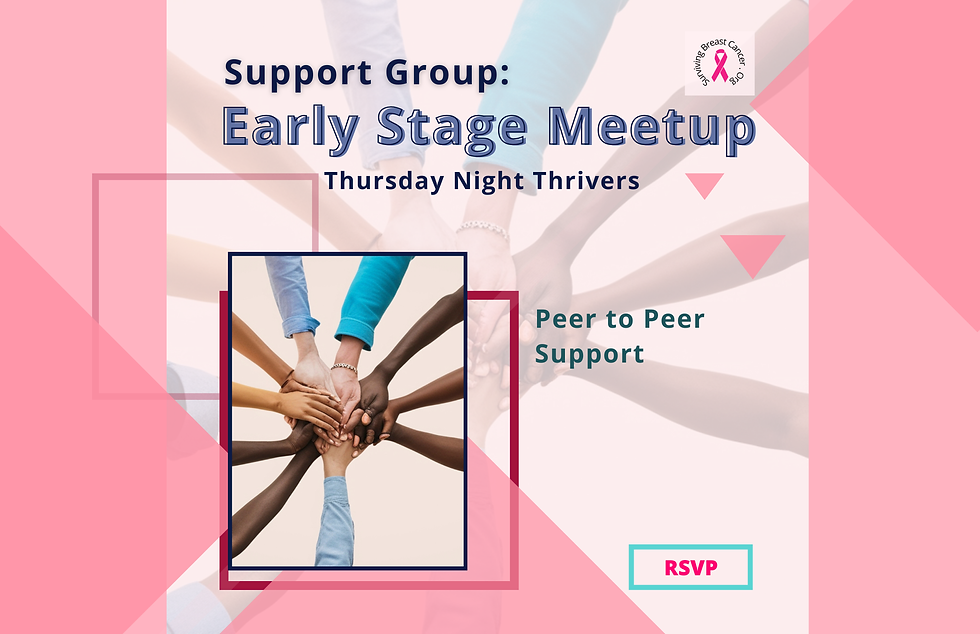Cancer Caregivers: Contending with Change
- Surviving Breast Cancer

- Oct 16, 2022
- 4 min read
Updated: Oct 16, 2025

As difficult as it may be to grapple with breast cancer as a patient or a survivor, it’s important to remember that caregivers may also experience their own struggles in trying to manage a breast cancer journey. Whether it’s understanding a new diagnosis, managing lifestyle adjustments, treatment regimens and doctor’s appointments, or grieving a loss, caregivers have their own, often difficult experience with breast cancer, which may come with a variety of different emotions and mental states.
At SurvivingBreastCancer.org, we want to help support you through a breast cancer journey- whether you have or had breast cancer, or whether you are or were a caregiver to someone facing breast cancer, we are here for you. In order to help those who may be facing challenges as a cancer caregiver, we’ve compiled a collection of studies, articles, and support resources to bring awareness to some commonly experienced situations and feelings.

This article examined two different groups of potential caregivers to those with terminal breast cancer- spouses and adult daughters - and examined how caregivers in these two roles might differ in coping with being a caregiver, as well as how well caregivers were able to manage when their loved one passed. Researchers examined two models of bereavement adjustment before and after caregiving: the Relief Model, which predicts that mental stress would reduce following the end of caregiving responsibilities, and the Complicated Grief Model, which predicts that mental strain would increase following the end of caregiving responsibilities.
Overall, they found that regardless of role (spouse or daughter), older caregivers coped better with the loss of a loved one, as measured by anxiety/depression symptoms and resource losses over time. While spouses showed a significant correlation between these metrics and overall coping status following loss of a loved one, daughters did not exhibit a correlation. Overall, these results confirm that caregiver grief is a complicated process, and the experience of it may vary depending on a caregiver’s relation to the person with breast cancer. Read More
Members of the Breastcancer.org community living with metastatic breast cancer compiled a list of suggestions for those acting as a caregiver to someone with breast cancer. Their suggestions include:
Delegating tasks to outside support systems
Caring for yourself physically and emotionally
Being proactive in medical settings to advocate for your loved one
Making room for your loved one’s emotions
Creating a communication plan to effectively share and get information
Continue to support a life outside of cancer/cancer care
If you want to see these suggestions in more detail, Read More Here.


A cross-sectional study was conducted in 2008 by the American Cancer Society, interviewing cancer caregivers across the country. One of their more notable findings was that caregivers who have experienced the loss of their loved one have a particularly hard time coping following the loss. John Schall, CEO of the Washington D.C.-based nonprofit Caregiver Action Network, notes that “‘Intellectually, cancer caregivers know that they’re going to lose their loved one, but they are often still actively engaged in caregiving until the loved one passes’”, which can cause significant emotional upset long after a caregiver begins to grieve. To help caregivers going through this, Schall created the informational and support website helpforcaregivers.org; other researchers such as health psychologist Hoda Badr at Mount Sinai Hospital, are testing telephone programs for cancer caregivers to prevent burnout and reduce mental strain. Read More
Cancer Caregiver Support Groups

The James Cancer Hospital at Ohio State University regularly holds virtual support and information sessions on a variety of cancer topics. Below are a couple of caregiver-focused sessions that will be held in the near future:
Caregivers and Coffee Support Group: This group meets on the second Wednesday of every month, and is a space for cancer caregivers to discuss their stories, experiences, and concerns. Pregregister for the latest upcoming meeting here.
Caregiver Grief: Life After Loss Workshop: This workshop will address the unique grieving processes experienced by caregivers, and aims to give strategies and techniques to those facing grief following the loss of a loved one. Register here.
Living Well with Cancer as an LGBTQ+ Person: Resources for Cancer Survivors and Caregivers: This monthly seminar provides information on a number of topics relating to cancer and the LGBTQIA+ community. It is open both to cancer survivors and to caregivers, and aims to provide education and coping resources in a welcoming, inclusive space. Register here.
For those who are interested in some of The James’s other seminars, their full schedule can be found here.
We hope that these resources provide some much needed information and support, specifically in regards to a breast cancer caregiver’s journey. For those looking for additional support, the SurvivingBreastCancer.org app has community discussion boards and private groups so that you can connect with others and get peer to peer support. Also, check out the SurvivingBreastCancer.org caregiver’s support resources here.











